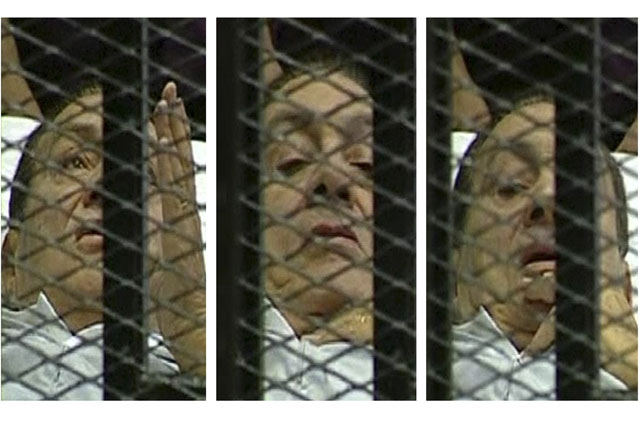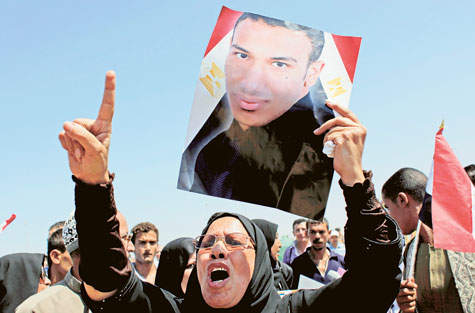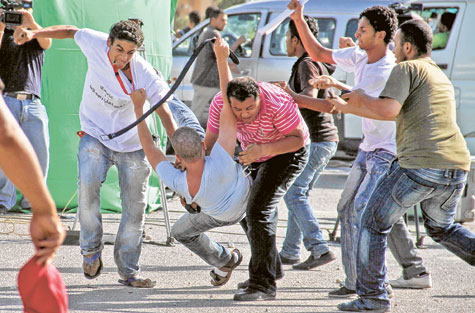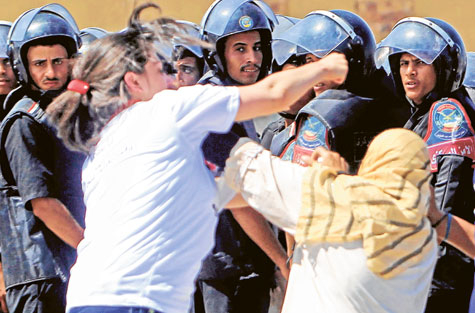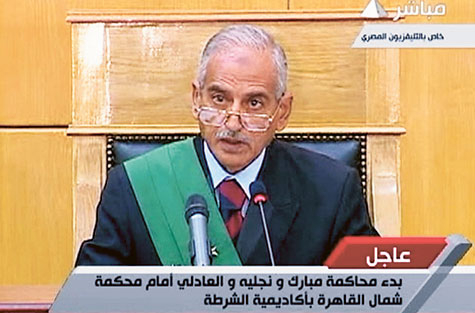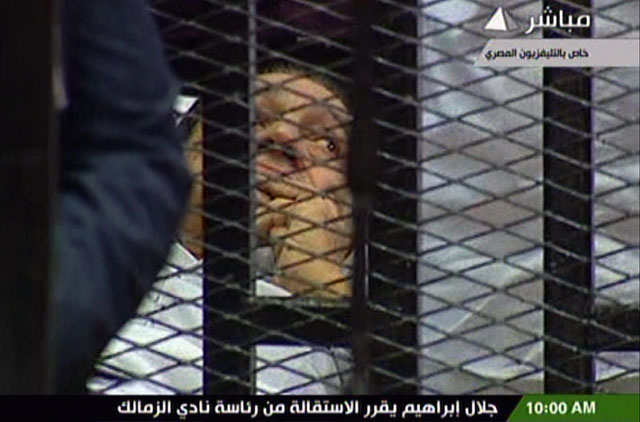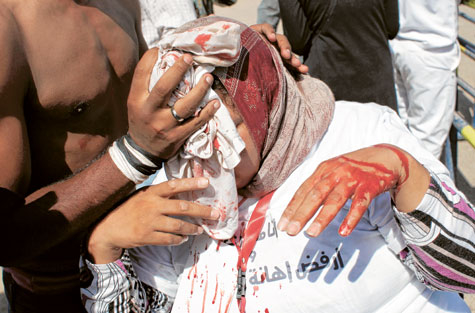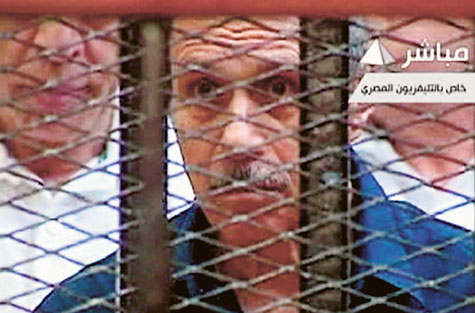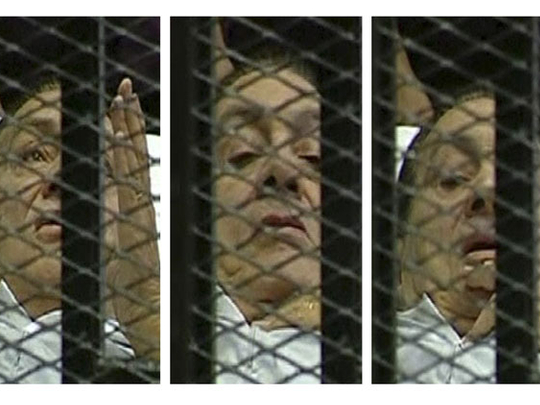
Cairo: The father of a 16-year-old protester shot and killed by police gasped quietly when he saw 83-year-old Hosni Mubarak enter the defendants' cage for his trial. In a fleeting moment of sympathy, his eyes welled with tears.
Then he smiled and called his wife. "She laughed for the first time. She told me that Mubarak picked his nose and his interior minister almost had tears in his eyes," chuckled Ramadan Ahmad, a retired naval officer.
- In pictures: Mubarak on trial
- Hosni Mubarak: Rise and fall
- Hosni Mubarak — Egypt’s fallen long-time pharaoh
For Ahmad and hundreds of other Egyptians who hold Mubarak responsible for the deaths of their relatives during the 18-day uprising that forced the longtime president to step down, the spectacle was both cathartic and spellbinding.
“It is a pivotal moment for Egypt. If this didn't happen, people would have gone wild. It would have been chaos for real this time," said Ahmad, 51, who watched Wednesday's televised proceedings at the Cairo offices of The Associated Press at AP's invitation. "But he did this to himself."
Seeing the man who ruled Egypt for nearly three decades now on trial "is difficult and emotional for a moment," Ahmed said. "He deserves this. His political stupidity and arrogance did this to him. It blinded and deafened him."
From his bed inside the defendants' cage, an ashen-faced Mubarak showed a glimmer of his old defiance. Egypt's former president wagged his finger in the air and denied all charges against him as he went on trial for alleged corruption and complicity in the deaths of protesters who helped drive him from power.
Wednesday's spectacle, watched live on state television by millions of Egyptians, calmed the fury of those who suffered under his rule - some of them parents of children gunned down during the uprising that toppled the longtime president.
The father of a slain protester, among those sweltering in the heat outside the courtroom on the third day of Ramadan, was ecstatic.
"The biggest achievement of this revolution is that all these crooks and scum are in a cage," said Mohammad Mustafa Al Aqqad. "We're here to tell Hosni, 'Happy Ramadan. Congratulations on your new cage.'"
The ailing 83-year-old Mubarak lay on a hospital bed as his sons, one-time heir apparent Gamal and wealthy businessman Alaa, stood protectively beside him, at times trying to shield their father from the camera and hundreds of spectators. Dressed in white prison uniforms, the two younger Mubaraks denied charges of corruption.
The sight of Mubarak lying helplessly in bed inside the grim metal and wire cage was a stunning moment for Egyptians - and for a region known more for absolute monarchs than democracy or accountability.
Ahmad said he never understood the ugliness of the regime until the death of his son Mohammad. "As a man of the armed forces, I had a relatively good living and I had no time to think of all the injustice that he had created in this country," Ahmed said.
He now says it is gratifying to watch "the lion in a cage" but takes pains to explain that his fight for retribution is no longer personal.
"I no longer want this to be about Mohammad," Ahmad said. "But Mohammad and the hundreds others must be immortalized. People must see gains in moments like these. When people see hope, they will pray for Mohammed and the others. If they don't, they will only call them reckless youth and curse them."
"We now don't have much in common with our ancestors the Pharaohs, but people look at them and say look at the great history. I hope these youths can bring this," he said.
As he spoke, Ahmed went through photos of Mohammed on his mobile phone, chronologically organized and labeled. A photo titled "The joy of my life" shows Ahmed holding the newborn Mohammed after delivering him late one winter night at their home.
"I took him to my chest," Ahmed recalled. "There was something special between me and him from then on," he said. "I was also the last one to kiss him before his burial."
A picture called "The moment of goodbye" shows Mohammed's head bandaged in the hospital after the shooting.
Ahmed said his son had begun grumbling about his slim chances for a better future under Mubarak's regime. He told his father he wanted to quit school because there were no job opportunities even after graduation. When the protests began, Mohammed joined without telling his father because he knew he would object.
On January 28, the protesters were gathered outside the police station in Alexandria's Muntazah neighborhood.
Ahmed wasn't there to see how his son died. But witnesses told him how Mohammed and his best friend, Karim, were taking cover in the courtyard of a mosque to dodge a hail of bullets coming from the police station. A bullet hit Karim in the stomach, and he fell to the ground.
Ahmed said his son became visibly upset and was quickly shot with a single bullet that cracked his skull. Mohammed died a week later.
"I tried to sue Mubarak at first. But the prosecutor told me no. You can't sue the president."
He said he declined bribes from mediators to drop court cases against police officers accused of shooting his son.
"It is not about money," said Ahmed, who was in Cairo on Wednesday as part of a campaign for the families of the victims. His wife, Nabila, watched the coverage at their home in Alexandria.
Ahmed and others have helped organize a nearly monthlong campaign of sit-ins in main squares in Egyptian cities, accusing the country's new military rulers of stalling on bringing former regime officials to justice.
They and other demonstrators also are challenging what they consider the slow justice and warped prosecution process of police officers being tried separately in the killing of 90 protesters in Alexandria, including Mohammed. Six of the defendants have been freed without bail until trial, raising fears that they would use their positions to threaten the families of victims.
Ahmed sees this as part of the legacy of Mubarak's regime when rarely, if ever, was a police officer brought to justice for crimes.
For Ahmed and many like him, Mubarak's trial is the first step. On Wednesday, they are bidding each other farewell over a collective meal to break the Ramadan fast, and will call off their sit-in in Alexandria, for now. "Now judges are trying the president himself," he said. "The first bead on the strand has fallen. The rest will follow."


